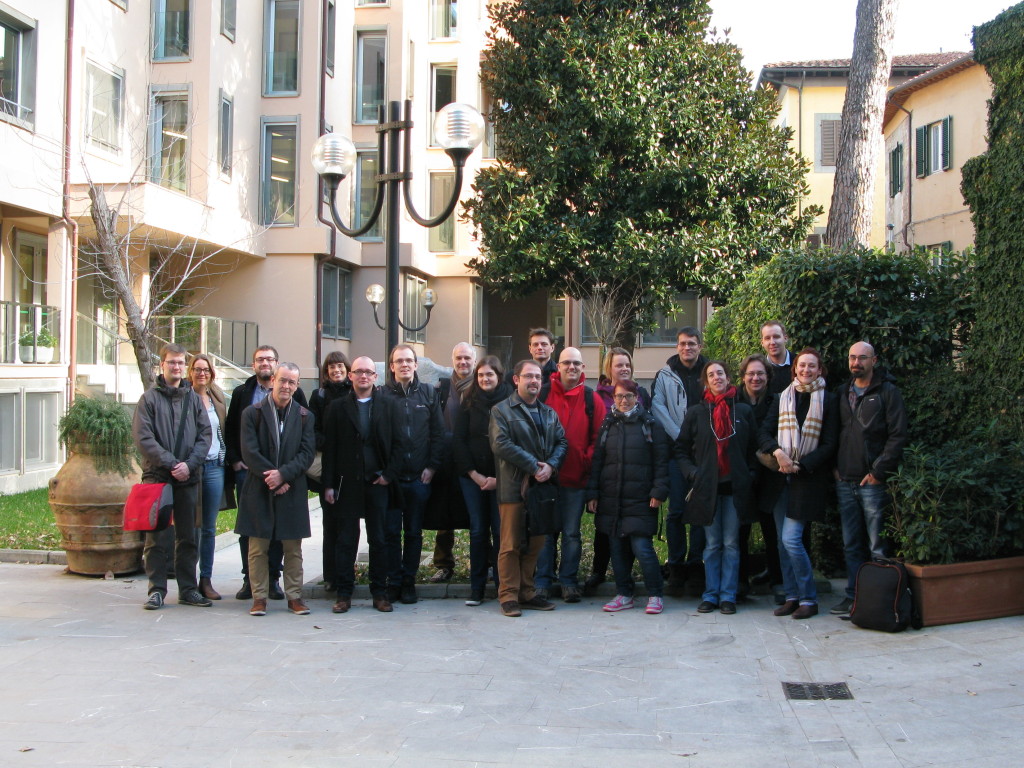
Last month the DM2E project organised its final event under the title ‘Enabling humanities research in the Linked Open Web‘. Over 50 participants gathered at the Auditorium Incubatore of the Polo Tecnologico di Navacchio near Pisa, Italy to hear more about the final results of the three-year project, as well as those of the winners of the second round of the Open Humanities Awards.
DM2E: context and background
The day started with a welcome on behalf of the project coordinator, Humboldt Universität zu Berlin, by Violeta Trkulja. She briefly introduced the project, the partners involved and the main activities and outcomes.
Then it was time for the keynote: Sally Chambers (DARIAH-EU and Göttingen Centre for the Digital Humanities) gave an inspiring talk on sustainable digital services for humanities research communities in Europe, and the role that the DARIAH infrastructure can play in this regard.
Antoine Isaac (Europeana) followed with an illustration of the relevance of the DM2E results in the wider context of Europeana, Europe’s platform to access cultural heritage. Because of the work done within the project, there is now more material available in Europeana that is relevant to digital humanities researchers, workflows for data aggregation have been improved and of course the EDM (Europeana Data Model) has been specialized for the manuscript domain.
DM2E results
The work package leaders of the four DM2E work packages then went on to present what has been achieved over the course of the project in the areas of:
Content aggregation to Europeana (WP1 – Doron Goldfarb, Austrian National Library);
The interoperability infrastructure, including the DM2E data model, ingestion and contextualization – even with an ‘Oh, yeah?’ button (WP2 – Kai Eckert, University of Mannheim);
The Pundit tool for semantic annotation and enrichment (WP3 – Christian Morbidoni, Università Politecnica delle Marche / Net7 & Alessio Piccioli, Net7);
Experiments conducted to investigate how humanists work with linked data and tools such as Pundit and to better understand their reasoning process (WP3 – Steffen Hennicke, Humboldt Universität zu Berlin);
And community building around open data for cultural heritage and humanities research (WP4 – Lieke Ploeger, Open Knowledge).
Open Humanities Awards – round 2
Another part of the programme was reserved for the winners of the second round of the Open Humanities Awards. The first winner of the Open track, Michael Piotrowski (Leibniz Institute for European History) talked about how the metadata of European peace treaties from the Early Modern period can be published as Linked Open Data and evaluate the use of the nanopublications format for such content, so that it can become a more valuable resource for the humanities. Read more
Also for the Open track, Rainer Simon (Austrian Institute of Technology) shared the success story of the SEA CHANGE (SEmantic Annotation for Cultural Heritage And Neo-GEography) workshops, where people helped turn raw geographical data into Linked Open Data with the Recogito geo-annotation tool. In just two workshops, nearly 15.000 contributions were made, a great crowdsourcing achievement. Read more
For the DM2E track of the awards, Max Hadersbeck (University of Munich) demonstrated the impressive FinderApp WITTFind, with which it is possible to search Wittgenstein’s Nachlass in an extensive way, because of the incorporation of a full-form lexicon and features such as highlighting the hits in the displayed facsimile – all very valuable for researchers. Read more
It was very inspiring to see the impact the Open Humanities Awards have had on furthering teaching and research in the humanities – once again congratulations to all winners!
DM2E Final All-WP meeting
On the following day, Friday 12 December, the project consortium held the final All-WP meeting in Pisa. The first part of the meeting was dedicated to wrapping up the achievements of the four work packages: each WP lead gave an overview of the main achievements in the project, with a focus on the final six months.
(for WP2 and 3, the slides were similar to those presented at the final event on 11 December, so you can find the slides above under ‘DM2E results’)
Then some time was reserved for a look at applications developed for creative use of cultural contents in another FP7 research project, AthenaPlus, presented by Gábor Palkó (Petőfi Literary Museum).
The day concluded with a collective lookback at lessons learned throughout the project, and preparation for the final month of reporting, wrap up and review. After two successful days it was time for a final concluding consortium lunch.
Many thanks to all participants for joining our final event, and of course you can follow us on either Twitter or our blog to stay updated on all final deliverables!

Comments are closed.